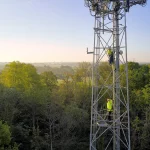Women’s World Cup 2023 Final Causes 16% BT Internet Traffic Surge

Broadband ISP BT (EE) claims that the FIFA Women’s World Cup 2023 has driven spikes of up to 16% in their UK data traffic as people streamed the Lionesses’ on-pitch action live, rising to a peak of 866TB (TeraBytes) during Sunday’s final against Spain – as many viewers streamed it via the BBC and ITV platforms.
The figure of 866TB was said by BT to be a tournament record and more than seven times the amount of data used to stream England’s opening game vs Haiti (118.5TB). By comparison, the semi-final clash against Sam Kerr’s Australia saw the second-highest levels of data traffic, with BT customers using 500TB of data to stream the match. During the game against the Matildas, BT customers used more fixed data streaming the game than they did using Facebook and TikTok.
England’s penalty shoot-out victory over Nigeria (aka – Super Falcons) then delivered the third-highest data usage (494TB). The match saw broadband traffic spike by 15.8% compared to an average day. Finally, England’s tight group stage match vs Denmark, which they needed to win to ensure passage through to the knockout rounds, saw BT’s fixed data traffic increase almost 8% during the match period, with customers using 237TB of data.
Advertisement
Anecdotal information from other broadband ISPs suggests that there was indeed a slight to mild uplift in traffic on Sunday. But it’s worth noting that many people will have been able to watch the match via traditional broadcast TV, since it fell on the weekend.
We also had a look at peak aggregate traffic across the London Internet Exchange (LINX), which topped around 6.978Tbps (Terabits per second). But peak traffic on Sunday’s – measured since 30th July 2023 – has typically hit around the 6.84Tbps to 6.93Tbps range, thus the new peak wasn’t radically above the recent normal.
Prior to the final, BT also monitored the hometowns of the England squad for increases in broadband data use as families and communities came together to support their local Lionesses. By comparing ‘normal’ demand over the channel that each game was streamed on, to demand during each game, BT revealed the percentage increase in data usage used to stream their tournament games.
The 13 hometowns with the biggest maximum increases were:
Chloe Kelly – Ealing 95%
Ella Toone – Tyldesley 87%
Rachel Daly – Harrogate 79%
Lauren James – Richmond-upon-Thames 78%
Mary Earps – Nottingham 77%
Alessia Russo – Maidstone 76%
Millie Bright – Sheffield 75%
Jess Carter – Warwick 74%
Keira Walsh – Rochdale 69%
Georgia Stanway – Barrow 65%
Lucy Bronze – Berwick-upon-tweed 64%
Mark is a professional technology writer, IT consultant and computer engineer from Dorset (England), he also founded ISPreview in 1999 and enjoys analysing the latest telecoms and broadband developments. Find me on X (Twitter), Mastodon, Facebook, BlueSky, Threads.net and Linkedin.
« Vodafone UK Trial Cloud Gaming on 5G Standalone Network Slice
ISP Shell Energy Broadband Launch New UK WiFi 6 Router »






















































Wasn’t broadcast in 4K on BBC or I suspect it would be even higher…
I guess they didn’t want to waste the bandwidth.
Lucky it was broadcasted by the BBc at all, they have no interest in sports. They just try to chase after ratings with commercial channel style junk
You don’t half post some guff Ad47uk.
Between TV and radio coverage the BBC broadcast thousands of hours of sports coverage.
No bad for an organisation that apparently don’t care about sport.
There was no point since the Host Broadcast feeds were in 1080p/50 HDR.
https://www.sportsvideo.org/2023/07/17/2023-fifa-womens-world-cup-production-teams-to-work-from-sydney-hub-social-media-plans-expand/
HDR would’ve been nice though
@Oggy, doing it on the radio is cheap, but how much sport do the BBc have on TV, that is worth watching? They have something called Football Focus, where they no doubt talk for a hour about it, not that I like football, in fact I am not a sporty person at all, I like motor racing and that is about it. The BBC went off sport when they allowed Sky to grab everything.
@Ad47uk
Come on, that’s a monumental attempt at moving the goal posts.
Yawn
My thoughts exactly.
Still both commented though, didn’t you?
ISP news website posts.. news from ISPs?
It’s useful to see how big events will push more and more traffic, and so knowing that ISPs are able to keep up with this is useful.